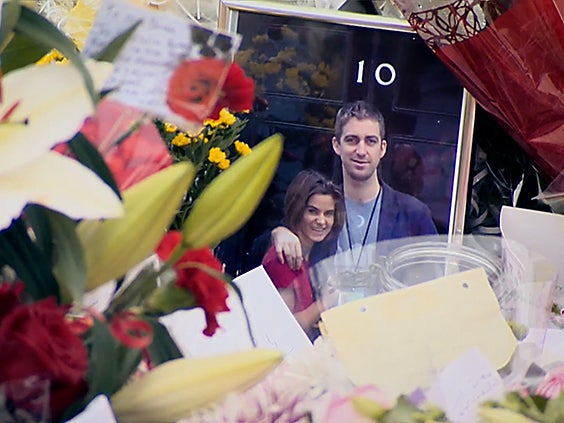Last night's TV: Jo Cox: Death of an MP (BBC2), The Baby Boomers’ Guide to Growing Old (More4)
The documentary looks at the right-wing terrorist, Thomas Mair, who murdered Labour MP Jo Cox

Jo Cox: Death of an MP was as much about the life of her assailant as the circumstances of her murder a year ago – and a timely reminder that not all terrorists are Islamists. Her assassin, Thomas, “Tommy”, Mair was a fairly conventional, if that’s the right word, fascist and white supremacist. In a sort of grotesque parody of Jo Cox’s much-quoted abiding words, he had “more in common”, arguably, with at least some of those who murder and maim in the name of Allah than that which divided him from them.
He acted alone, as some Islamists have, and he was radicalised online, as is also so often the case. Mair used his local library to search for extremist material, starting with the Wikipedia entries on the Third Reich and going on from there, though no-one has tried to blame Google for Mair’s self-indoctrination.
His home was a sort of shrine to National Socialism, with various bits of memorabilia and esoteric literature littering the place. I say littering, but the other striking thing about Mair was that he had obvious signs of Obsessive Compulsive Disorder, such as the extreme neatness with which he stacked his tins of beans, for example, all at precisely the same angle on the kitchen shelf.
How “mad” Mair was was realised to an extent by some in his community, and he was receiving some attention for mental health issues, again as some Islamists have. Yet no-one actually realised that he harboured such dangerous views, let alone such violent intent. No-one, until his capture, had ever seen his collection of Nazi stuff because he had no visitors. He never attended political meetings or rallies and was not a member of any party or grouping. He was a classic “loner”. He could not have “slipped through the net” because there was no net, that is intelligence gathering or surveillance, which could conceivably have “caught” him. He had no criminal record.
Thus, there was no opportunity, apparently, to lead him away from his plan to take the life of a member of Parliament, someone he regarded as a race traitor. We know that at least because at his magistrates court hearing he gave his name as “Death to Traitors, Freedom for Britain”, and because when he was carrying out his assault he uttered the phrase “Britain First”. Mair, serving life at HMP Frankland, has said nothing more about the motivations for his crime. In some respects, his life was a mirror of the would-be political assassin Khalid Masood, responsible for the Westminster attacks earlier this year, and around the same age as Mair.
The lessons to be learned were clear enough. The most disturbing one is that there is no way in which our own “war on terror” can be won, because there is no shortage of recruits, no shortage of material for them to be instructed and inspired by, and no way for every potential assassin, bomber or knife-wielding fanatic can be detected, let alone detained. Mair’s community could not have “done more” to restrain him because they had no idea what he was really like.
The programme also suggested – but rightly did not lay too much emphasis on it – that the nasty and hysterical political atmosphere that accompanied much of the EU referendum campaign (Jo Cox was killed a week before polling last June), may have been the final factor that pushed Mair over the edge. Like the makers of this compelling, forensic and understated piece of work, I need not, I hope, labour that particular point.
The Baby Boomers' Guide to Growing Old had a great deal of sex in it, and the various celebrities lined up to explain how the generation that invented sex, drugs and rock and roll spent a good deal of time discussing the merits of lovemaking in the twilight (metaphorical and literal). Edwina Currie, 70, for example, still regards herself as “fun in bed”, although that declaration was delivered with just a hint of menace. Could have been deliberate, I suppose. John Prescott, 79, seemed keen to discuss playing with himself, but his segment that was mercifully short (I mean the amount of time spent on this topic in the show, not his notoriously modest manhood, famously described by one former lover as resembling a chipolata).
Some, such as Amanda Barrie, 81, Henry Blofeld, 77, and Stanley Johnson, 76, were apparently blissfully happy in their relationships, but others had just a touch of loneliness about them. I was much taken, for example, by the lively force of nature that is Esther Rantzen, 76, but looking a little vulnerable these days. She was visibly rejuvenated by a dance class where she was swarmed by lots of old blokes whose dream woman off the telly, circa 1976, had miraculously sashayed into their wrinkly lives. One of them she even fancied, but maybe he didn’t feel the same way about her. That’s life, eh?
Join our commenting forum
Join thought-provoking conversations, follow other Independent readers and see their replies
Comments
Bookmark popover
Removed from bookmarks